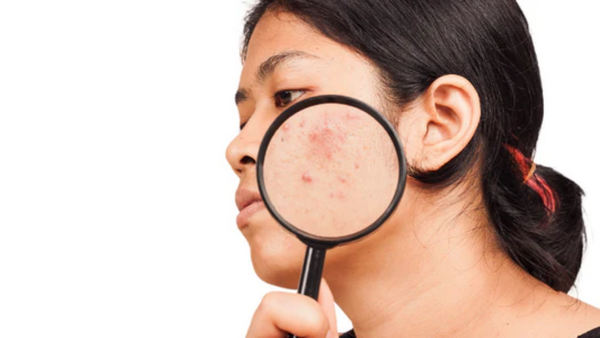At some point, every healthy woman will have her last period - the so-called menopause. It marks the transition from the phase of life in which women can have children to the phase in which pregnancies are no longer possible. We will explain to you exactly what the so-called "menopause" is and give you tips for a diet that can help you cope with this change.
IT'S WORTH READING!
AT THE END OF THE ARTICLE WE WOULD LIKE TO GIVE YOU A LITTLE JOY WITH A VOUCHER!
Menopause- A brief explanation
Women who have reached or exceeded a certain age (on average 52 years) enter menopause, the period of hormonal change at the end of the fertile phase of life. Menopause is the time of a woman's last menstruation, followed by no menstrual bleeding for at least twelve months, thus ending the woman's fertility.
The age at which menopause occurs varies from woman to woman and is medically described in three phases: premenopause, perimenopause and postmenopause.
Menopause can cause many changes in a woman's body. These symptoms are the result of decreased production of estrogen and progesterone in the ovaries. During the transition and beyond, the hormone estrogen begins to decline, disrupting the normal cyclical pattern of estrogen and progesterone. [1]
Symptoms may include hot flashes, weight gain, or vaginal dryness. Menopause may also increase the risk of certain diseases such as osteoporosis. [2]
The symptoms vary greatly because the hormones involved have many effects on the female body. For example, estrogen regulates the menstrual cycle and also affects the following areas of the body:
- Bone
- Urinary tract
- Hair
- Heart
- Blood vessels
- Pelvic floor muscles
- Breasts
- Reproductive organs
- skin
- Mucous membranes
- Brain
Decreasing estrogen levels negatively affect metabolism, which can lead to weight gain. These changes can also affect cholesterol levels and the way the body digests carbohydrates. [3]
Many women suffer from other symptoms such as sleep disorders in addition to hot flashes during this transition phase. [4]
In addition, hormonal changes lead to reduced bone density, which can increase the risk of bone fractures. [5]

Fortunately, dietary changes can help ease the symptoms of menopause. Avoid foods like alcohol or caffeine, added sugar and processed carbohydrates, and spicy foods.
Menopause - symptoms and signs
Every woman experiences menopause in her own way. Symptoms are usually more severe when menopause occurs suddenly or over a shorter period of time.
Conditions that affect ovarian health, such as cancer or removal of the uterus (hysterectomy), as well as certain lifestyle habits, such as smoking, usually increase the severity and duration of symptoms. [6]
Hot flashes are considered to be the most common symptom of menopause. They can occur during the day or at night. An estimated 80 percent of women experience hot flashes during menopause. [7]
Some women also experience muscle and joint pain, known as arthralgia. Mood swings are also very common. However, it can be difficult to determine whether these symptoms are caused by hormonal changes, lifestyle circumstances, or the aging process itself.

Aside from changes in menstruation, the symptoms of perimenopause, menopause and postmenopause are generally the same. The most common early signs of perimenopause include:
- Less frequent menstruation
- Heavier or lighter periods than usual
- Vasomotor symptoms such as hot flashes, night sweats and skin redness
Other common symptoms may include:
- Vaginal dryness
- Painful or stiff joints
- Decreased libido, or sex drive
- Depression
- Anxiety
- Heart palpitations
- Memory problems
- Thinning hair or hair loss
- Dry skin, mouth and eyes
- Increased urge to urinate
- Sore or tender breasts
- Headache
- Urinary tract infections
- Lower muscle mass
- Difficulty concentrating
- Increased hair growth on other parts of the body
Your period may not be as regular as it used to be. Bleeding may be heavier or lighter than usual, and you may experience occasional spotting. Periods may also be shorter or longer.
If your period is absent, you should definitely rule out pregnancy. If you are not pregnant, the absence of your period may indicate the onset of menopause.
If spotting occurs again after 12 consecutive months without a period, you should consult your doctor to rule out serious illnesses such as cancer.
Menopause - Recommended foods
fruit and vegetables
Fruits and vegetables are rich in vitamins , minerals , fiber and antioxidants .
A one-year intervention study of more than 17,000 menopausal women found that hot flashes decreased by 19 percent in those who ate more vegetables, fruits, fiber, and soy compared to the control group. The decrease was attributed to the healthier diet and weight loss. [8]
Cruciferous vegetables may be especially helpful for postmenopausal women. In one study, eating broccoli reduced levels of an estrogen linked to breast cancer while increasing levels of an estrogen that protects against breast cancer. [9]
In another eight-week study of 91 middle-aged women, those who took 200 mg of grape seed extract daily had fewer hot flashes, better sleep, and lower rates of depression than a control group. [10]
Healthy fats
Healthy fats, such as omega-3 fatty acids , can help women during menopause.
A review study of 483 menopausal women concluded that taking omega-3 supplements reduced the frequency of hot flashes and the severity of night sweats. [11]
However, another analysis of eight studies on omega-3 and menopausal symptoms produced a differentiated result: the positive effect of the fatty acid on hot flashes could not be confirmed. The results are therefore currently inconclusive. [12]
Foods highest in omega-3 fatty acids include fatty fish such as mackerel, salmon and anchovies and seeds such as flaxseed, chia seeds and hemp seeds.
Whole grains
Whole grains contain many nutrients, including fiber and B vitamins such as thiamine, niacin, riboflavin and pantothenic acid. [13]
A diet high in whole grains is associated with a lower risk of heart disease, cancer and premature death. [14]
A study of more than 11,000 postmenopausal women showed that consuming 4.7 grams of fiber per 2,000 calories per day reduced the risk of early death by 17 percent, compared to consuming only 1.3 grams of fiber per 2,000 calories. [15]

Whole grains include brown rice, whole wheat bread, barley and rye.
High-quality protein
The drop in estrogen during menopause is associated with a decrease in muscle mass and bone strength. [16]
For this reason, women going through menopause should eat more protein. Guidelines recommend that women over 50 consume 1-1.2 grams of protein per kg of body weight daily, or 20-25 grams of high-quality protein per meal. [17]
The recommended macronutrient distribution for protein is 10-35 percent of total daily calories. [18]
In a one-year study of 131 postmenopausal women, participants who took 5 grams of collagen peptides daily had significantly better bone mineral density than those who took a placebo powder. [19]
Collagen is the most abundant protein in our body.
In a large study of adults over 50 years of age, consumption of milk protein was associated with an 8 percent lower risk of hip fractures, while consumption of plant protein reduced the risk by 12 percent. [20]
Protein-rich foods include eggs, meat, fish, legumes and dairy products. You can also stir protein powder into smoothies or baked goods.
Dairy products
The decline in estrogen levels during menopause may increase the risk of bone fractures in women. Dairy products such as milk, yogurt, and cheese contain calcium , phosphorus, potassium , magnesium , vitamin D , and vitamin K , all of which are important for bone health. [21]
In a study of about 750 postmenopausal women, those who consumed more dairy products and animal protein had significantly higher bone density than those who ate less of them. [22]
Dairy products may also contribute to better sleep . One review study found that foods high in the amino acid glycine - such as those found in milk and cheese - promoted deeper sleep in menopausal women. [23]
In addition, there is evidence that consuming dairy products may reduce the risk of premature menopause (before age 45). In one study, women with the highest intakes of vitamin D and calcium - which are abundant in cheese and fortified milk - had a 17 percent lower risk of entering early menopause. [24]
Conclusion: A change in diet can calm the waves
Menopause is the natural end of a woman's menstrual cycle and thus marks the end of fertility . It is associated with changes in metabolism, lower bone density and an increased risk of heart disease.
Many women suffer from menopausal symptoms in the last years before menopause, especially hot flashes and night sweats.
A whole foods diet rich in fruits, vegetables, high-quality protein and dairy products may reduce menopausal symptoms. Healthy fats such as omega-3 fatty acids may also help.
Although symptoms can be difficult to manage, proper nutrition and regular exercise can help ease this important transition in life.
AS PROMISED, YOU WILL RECEIVE A 10% VOUCHER ON OUR OPC PREMIUM , LIPOSOMALIC OPC , Omega-3 , Vitamin B complex forte , VITAMIN D3 CAPSULES , collagen , potassium , calcium andmagnesium .
JUST COPY THE CODE MENO+V10 AND ENTER IT AT CHECKOUT.
Click here to SHOP
[1] https://www.nia.nih.gov/health/what-menopause
[2] https://pubmed.ncbi.nlm.nih.gov/29583083/
[3] https://pubmed.ncbi.nlm.nih.gov/24734243/
[4] https://pubmed.ncbi.nlm.nih.gov/24012626/
[5] https://pubmed.ncbi.nlm.nih.gov/27801706/
[6] https://www.ncbi.nlm.nih.gov/pmc/articles/PMC5888979/
[7] https://www.ncbi.nlm.nih.gov/pmc/articles/PMC6459071/
[8] https://www.ncbi.nlm.nih.gov/pmc/articles/PMC3428489/
[9] https://pubmed.ncbi.nlm.nih.gov/10952093/
[10] https://pubmed.ncbi.nlm.nih.gov/24518152/
[11] https://pubmed.ncbi.nlm.nih.gov/18328014/
[12] https://pubmed.ncbi.nlm.nih.gov/29937484/
[13] https://pubmed.ncbi.nlm.nih.gov/19079919/
[14] https://pubmed.ncbi.nlm.nih.gov/27301975/
[15] https://pubmed.ncbi.nlm.nih.gov/10875605/
[16] https://pubmed.ncbi.nlm.nih.gov/19949277/
[17] https://pubmed.ncbi.nlm.nih.gov/25082206/
[18] https://www.ncbi.nlm.nih.gov/pmc/articles/PMC4924200/
[19] https://pubmed.ncbi.nlm.nih.gov/29337906/
[20] https://pubmed.ncbi.nlm.nih.gov/28074249/
[21] https://pubmed.ncbi.nlm.nih.gov/24695889/
[22] https://pubmed.ncbi.nlm.nih.gov/28077378/
[23] https://pubmed.ncbi.nlm.nih.gov/25660429/
[24] https://pubmed.ncbi.nlm.nih.gov/?term=Purdue-Smithe+calcium

















